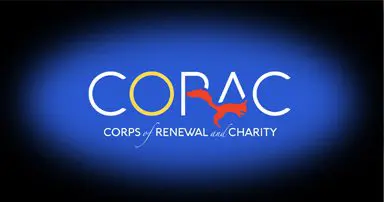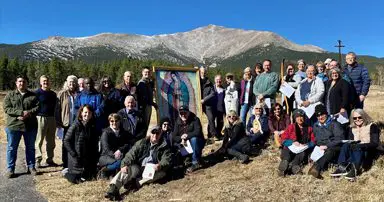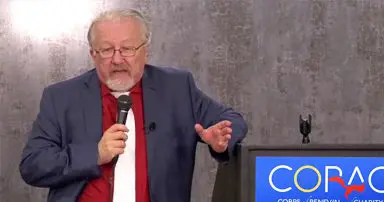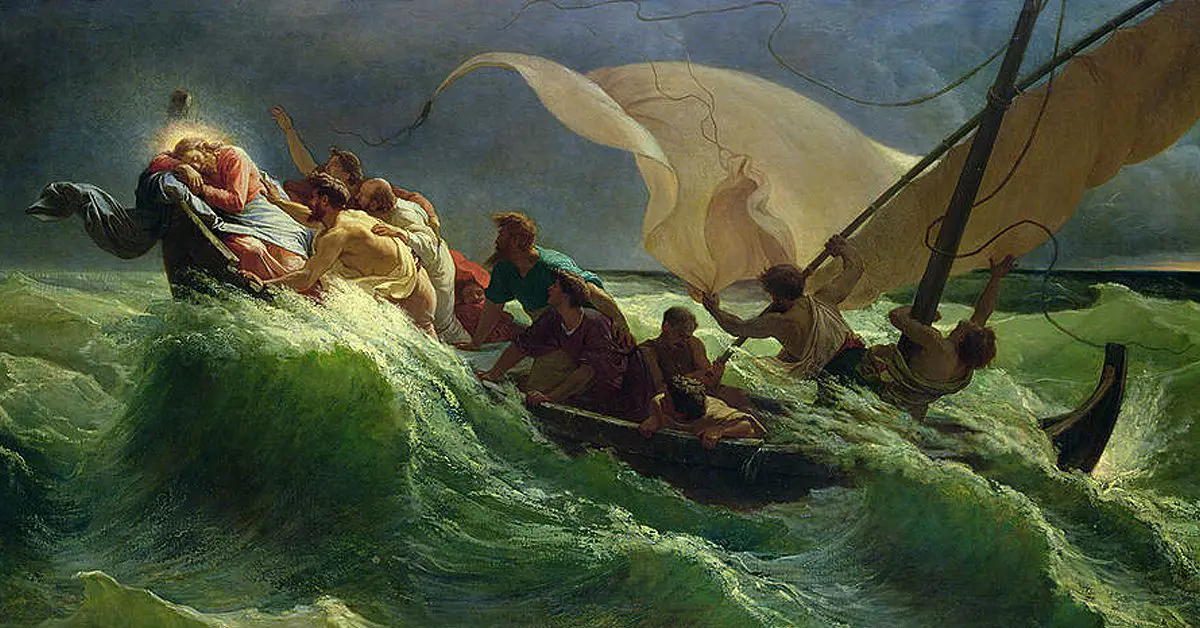South Haven, Michigan – As we enter more deeply into this Lenten season, many Catholics are shaken as it becomes undeniable that the call for sinful dysfunction is coming from inside the house. The Pope is a hot mess who calls for tolerance and inclusion as he stamps out any meaningful dissent (Bp. Joseph Stickland) and suppresses the form of worship that has been the greatest growth sector in the Church – the Latin Mass. I had thought that, perhaps for his Lenten sacrifice, the Pope might order that a Latin Mass be celebrated once a week in each Parish in the world. Or maybe appoint Bp. Strickland to replace Cdl. Fernandez as prefect of the Dicastery for the Doctrine of the Faith. However uncomfortable for Pope Francis, either move would be a great boon for all serious Catholics. It is depressing that these days a traditional, orthodox Catholic justifiably suspects that Jihadists, abortionists, and Communists are in better standing with the Pope than they are.
Cardinal Victor Manuel Fernandez, the Argentinian confrere appointed by Pope Francis to head the Dicastery on the Doctrine of the Faith (DDF) is a two-fold insult to the faithful. While Cdl. Fernandez would be well-suited to acting as editor of the old Penthouse Magazine Forum, he is clearly out of his depth at the DDF. It is not just his cavalier attitude towards Magisterial teaching that offends, but that he is such an intellectual lightweight. It is as if the old William Buckley-Gore Vidal debates had replaced Vidal with Rodney Dangerfield. This slyly intimates that, contrary to that old fud, Jesus Christ, doctrine is not important. That would mean that truth is not important.
We are bombarded almost daily with Priests, Bishops, high Vatican officials, and the Pope, himself, telling us that all that Christians were taught for 2,000 years in an unbroken line from Christ, the Apostles, and the Fathers of the Church is wrong. They tell us, with the smooth confidence of the best flimflam men, that they are engaged in the development of doctrine. It is all sleight of hand. Doctrine has been and should be developed over the millennia, as close study reveals new insights into the bottomless depths of Scripture. But authentic development cannot contradict defined doctrine and it must be consistent with reasonable interpretation of Scripture. Beyond that, development must be ratified and consented to by the Bishops of the world. There are a lot of safeguards there that some of the Church’s top officials are blowing right through. They are not engaged in development; they are engaged in breach. This is thought, by many, to presage the crumbling of the Church just as America and Western Civilization are crumbling before our agonized eyes. Ah, but the Church has something neither America nor Western Civilization have – the blunt guarantee from God, Himself, that His Church will endure to the end of time and that the gates of hell will not prevail against her.
I have a different take – a take different enough that I pay no more attention to scandals in the Church than I am required to for these missives. I think God is gathering all the elites of the world who have turned predator into the high places, isolated from the people they are supposed to serve and shepherd. Actually, He is allowing them to isolate themselves. Like the cat who was belled, they think it is a glory and a distinction that they have taken on honors and privileges that they forbid to the little ones below them. But God has allowed them to separate so that when sudden destruction comes to all the false teachers and rulers, most of the humble little ones of God will be spared – spared to build anew a Kingdom to God.
The old Soviet Union was masterful at smoking out, then crushing, dissent. It would send in an agent provocateur, a man who would come into a suspected hotbed of dissent, insinuate himself into the community, then pretend to be a deeply discontented dissident, himself, until he had identified all who shared that discontent. Once identified, the dissidents were destroyed. I do not suggest that someone who is orthodox is playing the dissident from Christ’s teaching in the hierarchy (though there is a LOT of pretense surrounding it all). Rather, I say it has pleased God to allow hostility to the Gospel to be dominant for a time – in order to smoke out all who take on Christ’s mantle while denying His power and primacy. God, of course, already knew who they were. He has led them, by their hubris, into revealing themselves to all of us. What, then, will we do? We are beckoned to become God’s troops in His plan to renew His Church. But we are troops under discipline.
It is not ours to abandon or overthrow the hierarchy that Christ, Himself, established and gave authority to. God never coerces our will. When He suffers abuses to hold sway for a time it is either to accomplish some greater good or to instruct us. One might say, well, nobody expected this. I have news for you. Christ did. Long before He ever ascended, He knew this day would come. And long before He ever ascended He knew how He would use these abuses to accomplish His will. In fact, He knew how He would use these abuses to refine our understanding of His sovereign will.
I am close to more than a few Priests of Opus Dei. All of these are proud of their fidelity to the Magisterium and their loyalty to the Holy Father. Right around the turn of the Millennium, I told three of them that Pope John Paul II was easy to be loyal to, but they had best prepare themselves for a time when it would be difficult to balance their duty of fidelity to the Magisterium with their duty of obedience to their chief superior. We are there.
In the first millennium of Christian history almost all the great controversies were over the nature of Christ. A controversy would shake the Church until it seemed it was going to be split or splintered into nothing. Then it would be resolved and all would be well – only to be followed by yet another great controversy over yet another aspect the resolution of the previous controversy had not resolved. Finally, after over a little more than a thousand years, almost all of the major controversies over the nature of Christ had been settled.
Almost immediately began the new controversies. They were almost all over the nature, extent, and limitations of legitimate authority. The first shot was fired in 1054 A.D. when many of the Eastern Churches severed communion with the Pope while preserving the sacramental nature of worship and practice. While the stated reasons for the split were theological, that was just a gloss over what was primarily a political dispute, despite the pious mewlings by both Orthodox and Catholic authorities to justify breaking Christ’s command that all be one. While it had always been the case that each Diocese in the world was an independent jurisdiction, tethered to the larger Church by Sacred Scripture, Tradition and the Magisterium, the Pope was the only authority who could speak for the whole Church. The Pope was the primary guardian and guarantor of the Magisterium. While the Magisterium could be refined with new insights into the depth of Christian doctrine, those insights must be consistent with the faith (settled doctrine could be refined, but not contradicted) and those refinements must come with the approval of the Pope, and with the consent of the Bishops of the world. Though the hierarchies of Orthodox Churches have done a good job at avoiding imprudent theological and liturgical innovations (certainly better than the Catholic hierarchy this last decade and a half), the fundamental unity of the faith was breached by this split. It was a little crack in the hierarchical (but not the spiritual) foundation of the Church.
With the crowning of Charlemagne in 800 A.D. came the beginning of the Holy Roman Empire. This was useful for Christendom, for a Bishop’s authority is entirely spiritual. Other than his administrative authority over his Church, he has no temporal authority – political, scientific, economic or otherwise. A specific Bishop may have those authorities in certain areas, but only due to appointments that are extraneous to his duties as a Bishop. Thus, in medieval times, the Pope was sovereign of the Papal Estates. This did not flow from his being a Bishop, but from him being the temporal sovereign of the Papal Estates. The concept was that for a fully Christian polis there should be both a spiritual and a temporal authority.
While not without accomplishment, the Holy Roman Empire was sporadic. Most of the time it was weak, finally dying out entirely during the Napoleonic Wars. During – and after – the Medieval Period the Pope (and some other Bishops) exercised substantial political influence, as is right and proper for the leadership of one of society’s great mediating institutions. They also often exercised actual political power which they did not formally have, due to the weakness of the Holy Roman Empire, the strength of particular Bishops, or an alliance with other secular authorities. Sometimes they acted prudently, sometimes they did not, and sometimes they made themselves mere cat’s paws of the temporal regime they served or allied themselves with. When it was the latter the results were almost uniformly disastrous, both for the Church and for the temporal regime that played the cat.
After the Napoleonic Wars, Popes became largely more circumspect about exerting political power. In the modern era, from Pope Leo XIII until Francis, Popes were careful to define which political practices and systems of government were consonant with Christianity and which were not while deferring from actual temporal activism. The modern era saw the rise of great and continuing encyclicals defining actual social justice (not to be confused with the current ‘social justice’ catchphrase which uniformly promotes social injustice). The list I linked to does not include what I consider the critical capstone, St. John Paul’s Centesimus Annus, which defines much of what makes for a legitimate and effective system of both governance and economics. Its emphasis on the principle of subsidiarity lays ruin to the intellectual vacuity of those who pretend our only choice is between anarchy and totalitarianism. It does this while elevating and sanctifying the principle of human dignity under God. Spoiler Alert: almost all my political and economic thought is anchored in Centesimus Annus, which was coincidentally issued in 1991, just about a month after I was received into the Church. It is, to me, what the Declaration of Independence was to Abraham Lincoln.
The Popes since Leo XIII until Francis, when speaking on a temporal matter – political, economic, scientific or otherwise – took pains to note that this was outside their realm of authority and was just their considered counsel. This humility in recognition of reality made their counsel careful and carefully considered – and, thus. strikingly worthy and sound. Pope Francis is the first (and I pray the last) post-modern Pope, gleefully taking up the mantle of those Popes who imagined themselves to be temporal emperors as well as the Vicar of Christ.
The doctrine of papal infallibility was defined at the first Vatican Council in 1870. Not one in a thousand Catholics actually know this doctrine, the limitations, and the carefully prescribed guidelines in which it can apply. I have never met a Protestant who is knowledgeable on the subject. But because of the word, ‘infallibility,’ the popular imagination took it to mean the Pope does not sin, the Pope can never speak error, or (most pernicious of all) that whatever the Pope says about anything is binding on all Catholics. In many ways, it was a response to the splintering of papal – and traditional Church – authority in the aftermath of the East-West split and the Protestant Reformation. While controversial even at its inception, it was consistent with historic Church doctrine in practice in its very limited claims, even for a staggering authority that was rarely to be used, and then in only the most carefully prescribed circumstances. Yet the errant notion of what infallibility meant in the popular imagination held sway over most public discussions of it. Quite frankly, the faithful, including the most pious, got lazier and lazier, delegating first all their moral decisions to the Pope and then, in latter years, even their decisions with little moral significance. They completely abandoned their duty of discernment of what is and is not legitimate authority and when it is and is not legitimately exercised. This was not so bad for a time, as we had an unbroken string of notably solid, even great, and often saintly Popes from Leo XIII (the first Pope elected after infallibility was defined) through Benedict XVI. These were Popes who were restrained in their claims, careful in their pronouncements (which is NOT to say never bold), and who took pains to differentiate what was within their authority and what was merely their counsel. But it was always a ticking time bomb, just awaiting a Pope who was not restrained, who was not careful, who had no humility except the ostentatious kind to arrive and set it off.
And so we come to Francis, the most political and rigidly authoritarian Pope of mine (or anyone else living’s) lifetime. Almost all Francis’ initiatives are designed to accommodate the Church to the world, rather than the world to Christ. He routinely asserts temporal authority he does not have. He routinely tries to amend or break with defined doctrine unilaterally through the use of motu proprios or just ignoring altogether that he is in breach of canon law. He does not ignore his spiritual duty but he sublimates it to his political pretensions and gears it all towards accomplishing his political and ideological aims. This comes as a shock to those who have comfortably, through the practice of over a century, abrogated what is their individual duty of moral discernment to whatever the Pope says. When they are shocked by their own practice of treating the Pope like a guru to robotically take instruction from on all things (including, presumably, their March Madness picks) rather than a spiritual leader with real, defined authority we will be at the beginning of wisdom.
For me, the moment of final breach was when Pope Francis knowingly accepted an offering to the pagan goddess, Pachamama, on the Altar of Christ. I said then that I believed it to be, “the abomination which makes desolate,” spoken of in Mark 13 – and I believe that still. Certainly, within months of that terrible moment, altars throughout the world were desolate, emptied by the Covid scare. Since then, almost everything coming out of the Vatican is a desolation.
If no other offenses had occurred in this papacy except the betrayal of Catholics and Bishops in China, that would be one of the greatest betrayals in the history of the Church hierarchy. As it is, it falls in the middle of a sack of offenses fuller than Santa’s pack. When Vatican officials speak of it at all, they defend it with perverse pride. But I will not make this piece a litany of offenses pouring forth from this Vatican. Rather, I intend to use it to illustrate the outlines of something new that God is doing.
Almost all the crises in the Church for the last millennium have been over the question of authority, the extent and limitations of it, and when it is exercised legitimately. My considered conviction is that this is the penultimate crisis after a millennium of tumult over that issue. God is bringing matters to a head.
Early clumsy statements and offenses by Pope Francis unsettled many Catholics, but not enough for them to question whether their practice of a lifetime had been reflexive rather than carefully considered. But it loosened up the certainty of their core assumptions. What began as a trickle has continually picked up speed and force. Now it is such a raging torrent it has shaken the convictions of all but the most mulish of even Ultramontanists.
I have long posited that the primary method God uses to reform abuses without coercing our will is a broad set of four stages: revelation, choosing sides, confrontation, then resolution. Almost the entire papacy of Francis has been a revelation of how deep the rot runs in some of the hierarchy. Now we are at the stage of choosing sides after seeing the reality of what faces us rather than the comforting images of our wishes. I personally think that the issuance of Fiducia Supplicans will be remembered as the moment the tide began turning dramatically. Bishops throughout the world ARE choosing where they will stand. Some are choosing noisily, some quietly, but this is a defining moment in where both Bishops and the faithful will cast their lots. I could be wrong, of course, but I do not expect the stage of confrontation to begin in earnest until after Pope Francis has passed from the scene. If the Cardinal electors try to saddle us with Francis, the Sequel, they cannot yet imagine the blowback they will receive. If they succeed, it will be a very short-lived success. But the moment of Francis’ passing is the moment the stage of serious confrontation begins.
Resolution in matters of faith always consists of the participation of men in the work of God. Because it is a mix of the natural and the Divine, it is always startling, fresh, and new. We men have a great problem with imagining what will happen, because we base our imagination of what will be from our experience of what has been. Our experience is so limited that we never get it right. Israelites expected the Messiah to be a Godly, martial leader. None of them could have expected it to be God, Himself, come in the flesh. No one could understand or imagine that Christ would infuse the substance of His being into the forms of bread and wine that we might truly eat His flesh and drink His blood…until He did it.
God is well into the sequence of stages which will renew His Church. Know this: no abuses, whether from below or from above, can prevent you from living your faith with fidelity, according to your station. One of the miracles of the Christian faith is that its foundational tenets are so simple and straightforward that the least of us can live it well, while its doctrines are so deep the greatest of us cannot begin to fathom its depths. It is a bottomless pool from which the most timid can wash but the boldest cannot find the bottom of.
There are many approved prophesies which posit the rise of a Great Monarch who will reconstitute the temporal arm of the faith even as a great, holy Pope rises to set the hierarchy aright. Then the Church shall soar up to God with both wings strong and fully functional. I believe it. But I routinely receive fanciful stories about the Great Monarch and what people think he is or imagine he will be. Frankly, I think that monarch will resemble these fantasies as closely as Jesus did the Jewish fantasies of the great military leader they thought He would be. God is doing something new – to purify and renew His Church.
It is wearisome to bear the flood of abuses which seem to gain power daily. The faithful can be tempted to despair because they cannot stop it or see any way it can be stopped anytime soon. I tell you to rejoice. The storm rages with rising fury around us and you think Christ sleeps in this tempest-tossed boat because He is unaware of our peril. He knows, He has a plan, and you are integral to that plan. Despair is just a temptation of the satan, the fear that Christ does not care, nor has power to calm the storm and set the boat aright. He cares and His power is omnipotent, but we must live the consequences of our complacency that we take the lesson deeply to heart, to become fearless and intentional disciples of the Living Christ.
Rejoice again, for Christ knew you before you were knit in your mother’s womb. He has chosen you to live in these times. You may not do what is needful, but you have the capacity to do so, for He chose you. What then should you do? Do the little you can, right in front of you, with faithful fidelity and confident trust in He who can do all things. He who endures to the end is he who will be saved. Acknowledge God, take the next right step, and be a sign of hope to those around you and God will show His mighty hand to all, bringing us to the Triumph of the Immaculate Heart.
God has invited each and every one of us to play our part in what may well be the second greatest story ever told. None of us have the starring role. Carry water, chop wood, set your shoulder to the plow – that is our role. The harvest is great but the laborers are few. Accept His invitation to join the Harvester. Instead of despair, rejoice. Rejoice, I say, rejoice!
*********
Many have sent me an article trashing the streaming series, The Chosen, that appeared in Crisis Magazine. I think The Chosen, along with The Passion of the Christ, are the two best artistic depictions of Christ I have ever seen. The woman who wrote the critical article is just pitching a fit because they don’t portray Christ in the way she imagines Him. I will give a fuller refutation in the next article to lead off the Corac National Newsletter.
*********
I have never struggled so mightily with any project as I have this Corac Handbook and Currency Manual. It seems that every time I think I am finished, something happens to stop me. I was close to issuing it late last fall. Then October 7th happened – and I knew I had to incorporate a full and solid defense component.
There are two other times I have been stymied at the conception of a project. In both cases, my focus was too broad. Once I narrowed it, they each started flowing. I had been panicked that time is short. Finally, less than two weeks ago I was confronted with the reality that this time, my focus has been too narrow. As I often say, God is always startling, fresh, and new. The Corac handbook and currency manual are merely two elements of a primer on building functional communities as everything collapses around us. Now everything is flowing. I am grappling with huge things now, things that are too big for me. But nothing is too big for God. I expect to have the full primer for effectively building and maintaining these communities ready right around Easter. I hope to put the finishing touches on it during Holy Week. This is my Lenten Project, my offering to God and for all of us. (Not to worry, I have given up candy, too).
The primer will be available both as a free PDF on the Corac website and as a physical booklet you can purchase. My most recent newsletter article was on Preparing for the Flood. Everything we do is geared to helping you prepare yourselves for serious troubles – and prepare to be beacons of light for all those who will be caught unawares by the fury of the storm. To that end, we have over 500 instructional videos and pdf’s already up at the Corac website with more coming. I know sometimes you feel like you are a lonely voice, crying in the wilderness. Nothing is lost in God’s economy. The price you pay now will be rewarded not just by being prepared to be a full laborer in God’s vineyard, but by being skilled at training the new laborers we will be flooded with.
Please, donate generously to Corac. Many people are working tirelessly to help people survive, build and grow a City of God. We don’t charge for membership or any of our instructional materials. We run on a shoestring. But we need to keep that shoestring vibrant to continue to offer the things we do. If you don’t like donating online, you can send a check to: CORAC, 18208 Preston Rd., Box D9-552, Dallas, Texas 75252. If you have never given before, please do so today. We have a core of donors who usually carry the load, but we need more people to share – and thus lighten – that load. (Now all you regular donors, I’m not letting you off the hook. Keep those cards and letters coming!)
I believe there will come a time when those who helped sustain Corac, whether with their time, their talent, or their treasure, will be sung as heroes to generations yet unborn. Of course, I would also really like to be confident that I can pay my hotel bill for my next talk. Please give today. God bless you.
*********
The second episode of our Emergency Preparedness series with Ed McCullough, is up and running. I have had a few who watched it complain that it is geared too much towards people who can get land and live rurally. I know quite well that a major purpose of Corac is to give you tools that you can use right where you are or where you can easily get to. This is a critical element of the Primer I am now flowingly at work on. Nonetheless, a lot of fundamental principles are similar wherever you are.
The final episode of this series will be devoted to questions you send to seven7questions@gmail.com. Please, ask questions specific to your situation. I have always known we can’t do everything, but that is no excuse not to do what we can – and to constantly work to expand the reach of what we can do. So, as they said in the old Laugh-In TV series of the 1960’s, “Sock it to me!” You’ll feel better and we will have a broader understanding of all we need to do.

If communication goes out for any length of time, meet outside your local Church at 9 a.m. on Saturday mornings. Tell friends at Church now in case you can’t then. CORAC teams will be out looking for people to gather in and work with.
Find me on Twitter at @JohnstonPilgrim
























0 Comments